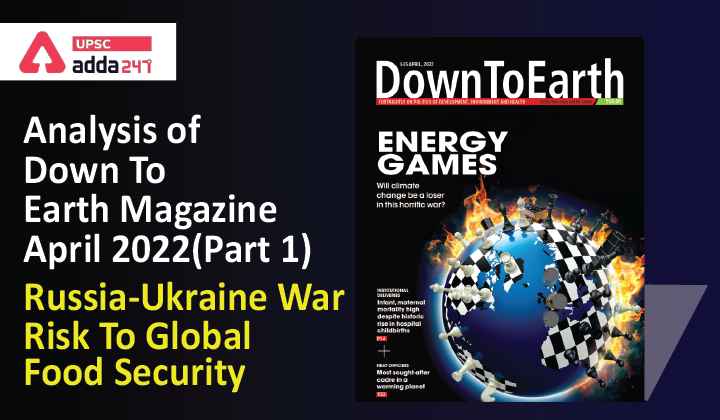Table of Contents
Analysis Of Down To Earth Magazine:
”Russia-Ukraine War: Risk To Global Food Security”
Relevance
”GS 2: Health, Government Policies & Interventions”
Introduction
- Apart from energy, the Russia-Ukraine war also poses risk to global food security.
- According to the UN Food and Agriculture Organization (FAO), the war is likely to raise prices by 8-22 per cent.
- Earlier, prices were already rising due to the COVID-19 pandemic.
- Both countries play leading roles in supplying global markets in foodstuffs, for which exportable supplies are often concentrated in a handful of countries, exposing these markets to increased vulnerability to shocks and volatility.
Food Prices Prior to the War
- Already prior to the war in Ukraine, international food prices had reached an all-time high. This was mostly due to market conditions, but also high prices of energy, fertilizers and all other agricultural services.
- In February 2022, the FAO Food Price Index reached a new historical record, 21 per cent above its level a year earlier, and 2.2 per cent higher than its previous peak in February 2011.
- FAO’s food price index, which measures changes in international prices of a basket of food commodities, jumped from 98.1 points in 2020 to 135.4 points in January 2022. It was at 140 points in February, the highest since 1961.
Recent History of Rising Food Prices
- This is not the first time food and fuel have seen simultaneous shocks.
- In 2005-08, oil prices peaked at US $100 per barrel due to high demand from India and China. At the same time, the index rose from 67.4 points in 2005 to 117.5 points in 2008.
- A similar trend occurred in 2010-14.
Two Global Food Players are fighting
- The Russian Federation and Ukraine are prominent players in the global trade of food and agricultural
products. - Ukraine and Russia together account for 30 per cent of global wheat, 18 per cent corn and 70 per cent sunflower oil exports.
- Since the invasion, wheat rates have jumped by 28 per cent, corn 23 per cent and barley 22 per cent.
- In early March, Ukraine banned exports of wheat, millets, live cattle, meat and other products to ensure domestic supplies.
- Prices could also rise if Russia in response to the global sanctions bans exports of essential food crops.
- Nearly 50 countries depend on the Russian Federation and Ukraine for at least 30 per cent of their wheat import needs.
- Of these, 26 countries source over 50 per cent of their wheat imports from these two countries.
Who will be immediately affected?
- A steep rise in prices could create widespread scarcity. West Asia and North Africa will be particularly affected.
- IMF estimates costs for harvesting, transporting and processing food could rise due to low fertiliser supplies and high oil prices.
- The crisis presents challenges to climate security, too.
- The war could increase deforestation and ploughing of grasslands to compensate for lost production.
Conclusion
Undoubtedly, this war will have multiple implications for global markets and food security, representing a challenge for food security for many countries, especially for low-income food import-dependent countries and vulnerable population groups. Joint, coordinated actions and policy responses are needed to address the current challenges for the people most in need and to mitigate the impact on food insecurity at the global level.



 TSPSC Group 1 Question Paper 2024, Downl...
TSPSC Group 1 Question Paper 2024, Downl...
 TSPSC Group 1 Answer key 2024 Out, Downl...
TSPSC Group 1 Answer key 2024 Out, Downl...
 UPSC Prelims 2024 Question Paper, Downlo...
UPSC Prelims 2024 Question Paper, Downlo...





